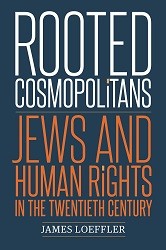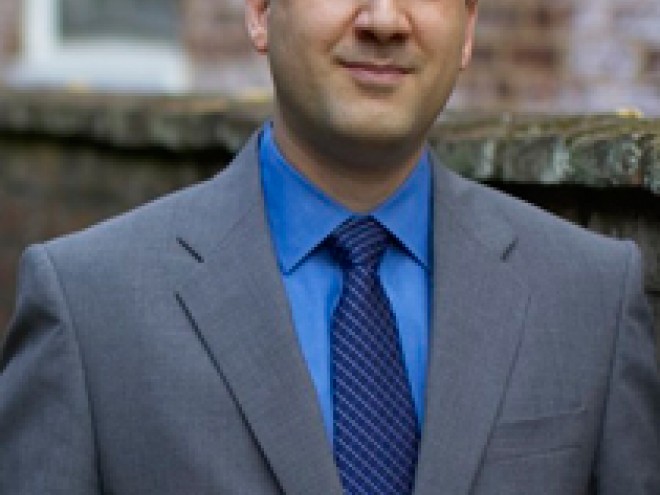
Celebrate Jewish Book Month with #30days30authors! JBC invited an author to share thoughts on #JewLit for each day of Jewish Book Month. Watch, read, enjoy, and discover!
This week, we are featuring the finalists and winner of the Natan Book Award at Jewish Book Council.
Today, James Loeffler, the author of the forthcoming book Rooted Cosmopolitans: Jews and Human Rights in the Twentieth Century, writes about his discovery of “The Third Roth.”
It was sometime in my first year of college when I discovered I had never heard of the greatest Jewish writer of the twentieth century. Or so I learned one day from a precocious friend with a subscription to the New York Review of Books. Have you read Joseph Roth? They say he’s the greatest Jewish writer of the century. You must mean Philip Roth? I responded. No, Joseph Roth. I paused, flummoxed. Then I tried again. Oh, you mean Henry Roth, the modernist immigrant bard, author of Call It Sleep? No, Joseph Roth. He’s Central European. The phrase conjured up Kafka. But I still drew a blank. Intrigued, I headed for the library to find out what was so special about this unknown Roth.
From the first pages of Joseph Roth’s magisterial 1932 novel Radetzsky March, I was hooked. Here was an author nothing like the other Roths or even Kafka. He didn’t play with language or stylize reality. Instead, he peered directly into the terrors of history, even as he sweetly eulogized his beloved Habsburg Empire and its anguished, expectant Galician Jews. In place of the two dominant images of Jewish Eastern Europe — shtetl sentimentalism and pre-Holocaust shadows — he offered a different Old World: majestic and cruel, violent and graceful. For many modern Jewish writers, irony was an escape from a harsh world. For Roth, it was a scalpel to cut still more deeply into the flabby tissue of the present.
What he exposed in those surgeries shocked me. I still recall my astonishment at seeing Roth mention Hitler by name in his first novel – from 1923! Already he sensed Europe was lurching towards an abyss, the Nazis were a dangerous new kind of political evil, and the Jews were the proverbial canary in the coal mine. The same held true for his poignant non-fiction. In his brilliant 1927 collection, Wandering Jews, he recognized in the uprooting of East European Jews after World War I a new kind of human category: the refugee. He went on to point out in his early 1930s writings that Jews were destined to suffer not only because of Nazi antisemitism or Western indifference but because of Europe’s own crisis. “Let me say it loud and clear,” he wrote in 1933 in “The Auto-da-Fe of the Mind,” his essay on Nazi book-burning, “The European mind is capitulating. It is capitulating out of weakness, out of sloth, out of apathy, out of lack of imagination.”
European Jews, however, did not suffer for lack of imagination. In my forthcoming book, Rooted Cosmopolitans: Jews and Human Rights in the Twentieth Century, I show how hard international Jewish lawyers fought in the 1920s and 1930s to create new kinds of law to protect minority groups from precisely the kind of rising terror of the times. In a sense, modern human rights began with these forgotten efforts. Yet these early human rights activists found themselves stymied by European politics at the newly created League of Nations.
I took the title of my third chapter, “Golden Shackles,” from a passage in Roth’s Wandering Jews. There he writes already in the 1920s of how the League of Nations is powerless to help the Jews of Europe. In spite of fancy titles and new laws, the League is hamstrung by the “golden shackles that its best-intentioned commissioners wear,” unable to issue basic papers to protect imperiled Jews. The same geopolitical forces that gave rise to the League held it hostage at the moment when it was needed most. “Animal welfare groups enjoy more popularity in every country, and with every level of the people, than does the League of Nations,” he adds bitterly.
“Golden Shackles” nicely sums up the fate of Jewish human rights activists before World War II. Much like the bureaucrats in Geneva, the Jewish rights-defenders found themselves hand-cuffed, in their case by the shiny bonds of British imperial politics. The one European power strong enough to stop anti-Jewish persecution in Europe and support the interwar Jewish human rights vision viewed Jews as a political liability because of the Arab-Jewish conflict in British Mandatory Palestine.
It is often said that Jews were the last true Austrians. Long after every other Habsburg citizen had become only a German, a Czech, a Pole or a Ukrainian, Jews like Joseph Roth held onto a broader liberal ideal of an Austria united in its diversity. But more than a nostalgia for a lost Austria, Joseph Roth also reminds us that Jews like him were arguably also the last Europeans. In fighting for international protection at the League of Nations, these Jews were the few remaining foot-soldiers who had yet to abandon “the noble ranks of the European army.”
Today, as we struggle to understand a new world of Middle Eastern refugees, rising antisemitism, and an unceasing Israeli-Palestinian conflict, it makes sense to re-read Henry Rothon the traumatic American Jewish experience of immigration and Phillip Roth on the complex American Jewish relationship to Zionism. But we should also not neglect Joseph Roth. His sober commentaries remind us that the story of modern human rights, too, has a Jewish past whose beginnings can be found in interwar Europe.
James Loeffler is Associate Professor of History and Jewish Studies at the University of Virginia, former Robert A. Savitt Fellow at the United States Holocaust Memorial Museum, and former Dean’s Visiting Scholar at the Georgetown University Law Center.



